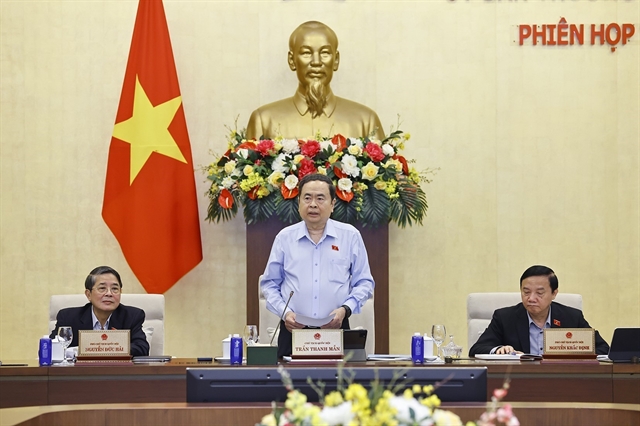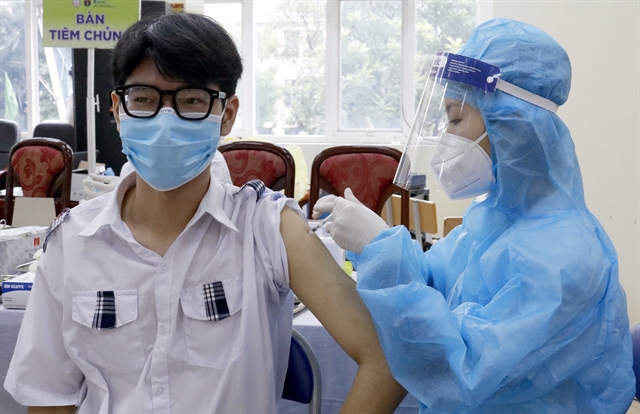 Society
Society

Việt Nam has administered 100 million doses of COVID-19 vaccine on Monday, nearly nine months after it commenced the ‘biggest inoculation drive in history.’

|
| COVID-19 vaccines being administered for Buôn Mê Thuột City in the Central Highlands Province of Đắk Lắk. The city has seen 98 per cent of the adult population receiving at least one dose of vaccine. — VNA/VNS Photo Tuấn Anh |
HÀ NỘI — The total doses of COVID-19 vaccines administered in Việt Nam crossed the mark of 100 million on Tuesday, eight months after the country began the biggest inoculation drive in history.
According to the National COVID-19 Vaccine Portal, as of Tuesday, 100,971,869 doses have been given, after over 1.1 million shots were administered on Monday. It should be noted that the country reached 50 million shots mark a month ago.
About 87 per cent of the adult population has received at least one dose of vaccine, while 47 per cent have received two doses.
The ministry aims to finish administering 150 million doses of vaccine (costing around US$1.1 billion) for 75 million people, or 75 per cent of the population by April 2022 to achieve herd immunity.
However, according to Deputy Prime Minister Phạm Bình Minh in Monday meeting with voters in Bà Rịa-Vũng Tàu Province, Việt Nam has received far more vaccines this year than the Government originally expected, with 135 million doses already arrived and 190 million doses anticipated by the end of 2021.
The amount of AstraZeneca, Sinopharm, and Pfizer vaccines received so far accounting for nearly 90 per cent of the national supply (figures as of November 7, according to WHO Việt Nam and health ministry's weekly situation report on COVID-19).
The 100-million-dose milestone is achieved as Việt Nam is battling a new concerning surge in coronavirus infections as more and more parts of the country are reopening after months of stringent lockdown during the peak fourth wave in July-September.
Only nine out of 63 provinces and cities, mostly in the northern and central region, posted lower than 70 per cent coverage of first dose in adult population, namely Thanh Hoá, Nghệ An, Thái Bình, Nam Định, Thái Nguyên, Sơn La, Quảng Bình, Hà Giang, and Hoà Bình.
Seventeen localities reached over 50 per cent of second-dose coverage, which are Long An, Khánh Hòa, Quảng Ninh, Đồng Nai, HCM City, Hà Nội, Lạng Sơn, Hà Nam, Bình Dương, Bắc Ninh, Ninh Bình, Lâm Đồng, Bình Phước, Tây Ninh, Đồng Tháp, Bà Rịa-Vũng Tàu and Bạc Liêu.
Seventeen localities – Ninh Bình, Quảng Ninh, Lạng Sơn, Lào Cai, Điện Biên, Hà Nam (in the northern region), Đà Nẵng (central region), HCM City, Đồng Nai, Tây Ninh, Sóc Trăng, An Giang, Vĩnh Long, Bình Dương, Kiên Giang, Cà Mau, and Hậu Giang (southern region) – have already begun vaccinating children aged 12-17 (16-17 years old given the higher priority at the moment).
About 1.4 million doses have been administered, covering 15.5 per cent of the total population in this age group.
More localities, including Hà Nội City along with Quảng Ngãi, Bình Phước and Long An provinces, have issued plans on inoculation for children and are expected to begin the drive soon.
The health ministry cleared Pfizer/BioNTech and Moderna types of COVID-19 vaccines for vaccination of children so far, with most of the 51 million doses that Việt Nam on order with Pfizer are set to be delivered within the final months of 2021 and early 2022 while Moderna likely coming from donations only.
The health ministry has submitted a plan on procurement of COVID-19 vaccines for 2021-22 to the Government for approval, with emphasis on free vaccination for all people in Việt Nam at least until the end of 2022.
Faster vaccination urged
The health ministry on Tuesday issued an urgent dispatch to all local administrations and respective health departments on expediting vaccination to reach 100 per cent of first-dose coverage in eligible adult population (with priority on people above 50 years old and/or having underlying health issues) and accelerate rollout of second doses as per the ministry's guidelines.
The ministry expects a quick reports on the amount of unused vaccines and the reasons for this. If localities, for some reasons, cannot use the vaccines in time or no longer have the demands, must report to the National Institute for Hygiene and Epidemiology to make redistribution plans.
Before November 20, all health departments must submit to the health ministry their report on the vaccines they need to cover 100 per cent of adults and children aged 12-17 by the end of the year and the demands for vaccines in 2022.
The local health departments will be held accountable if they fail to make the report and cause a shortage of COVID-19 vaccines in their localities, the ministry emphasised. — VNS

|
| Twelfth graders in Bắc Giang Province receive COVID-19 shots. — VNA/VNS Photo |




